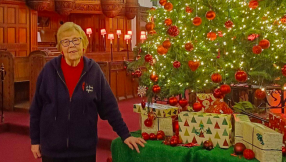Ambitions for church unity unrealistic, say leaders
The heads of the Anglican, Baptist, Methodist, Roman Catholic and United Reformed Churches spoke candidly this week of a loss of impetus in national efforts to bring about unity in their personal responses to questions put to them by the Church Times and Baptist Times.
“There is still at grassroots a great enthusiasm for unity - and a fair amount of impatience with denominational structures that are seen as failing to deliver it. Local Churches Together groups often have a good level of commitment,” said the Archbishop of Canterbury, Dr Rowan Williams.
“But you won’t find much interest in what you might call the ‘negotiating’ side of unity. A concern for common witness and a relaxed attitude to common worship, yes, but not much keenness on what the official bodies are up to in their dialogues.”
There is, he added, “an uncomfortable gap between national bodies and local enthusiasm”., while Churches Together in England and Churches Together in Britain and Ireland, for “all the excellence of their leadership . . . don’t kindle the imagination for most people in the Churches”.
His sentiments were echoed by the head of the Roman Catholic Church of England and Wales, the Cardinal Cormac Murphy-O’Connor, who said there had been a “slowing down of progress” in spite of increased commitment to unity. Dr Martyn Atkins, General Secretary of the Methodist Church, said there was “less enthusiasm for unity as an end in itself”.
The head of the Baptist Union of Great Britain, the Rev Jonathan Edwards, voiced frustration at the status quo.
“We have to make the best of what we’ve been given,” he says. “The inherent division of the contemporary church is painful and time-wasting, and it fundamentally distracts from the Good News.”
While structural convergence among the denominations remains a distant prospect, the Church leaders said there was nonetheless a greater commitment to joined up work at the local level.
The Rev Roberta Rominger, General Secretary of the United Reformed Church, spoke of a “partnership of purpose and action”, while Dr Atkins said there was “greater enthusiasm for focused ecumenical action” like community projects. He also acknowledged “the strength in having a unified voice on matters of social justice especially”.
Dr Williams suggested that the greatest prospects for church unity were to be found at the parish level.
“The truth is that top-down strategies for institutional union are very unlikely to work in the near future any better than they have in the recent past,” he said. “Prayer and silence and action together are the things that change us, and even change the world.”
The leaders’ comments coincide with the worldwide Week of Prayer for Christian Unity published in the latest editions of the Church Times, the Baptist Times, the Methodist Recorder and the URC’s Reform magazine.
The Week of Prayer for Christian Unity runs from 18 to 25 January. This year’s prayers for unity have been put together by the church in Korea and are inspired by Ezekiel 37.15 – 28 when God spoke to Ezekiel and said "they shall be one in my hand...They will be my people and I shall be their God".













